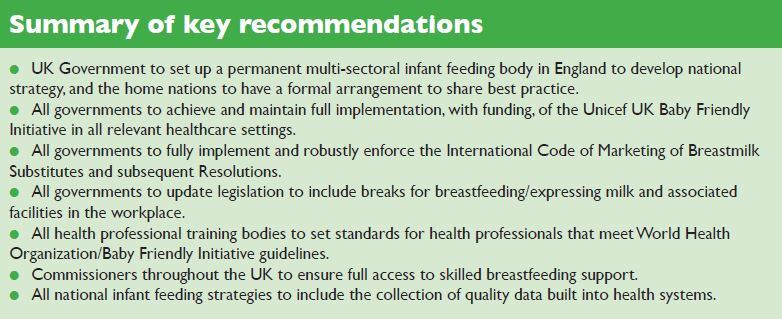The report calls for greater support for mothers who wish to continue breastfeeding.
It says three out of five (63%) UK mothers who had stopped breastfeeding by six to eight months said they had actually wanted to breastfeed for longer.
According to the report's scorecards, Scotland and Northern Ireland have done most in introducing policies and programmes to improve low breastfeeding rates in the UK.
They scored 102.5/150 and 102/150, respectively, based on calculations of ten policy and programme areas, including implementation of UNICEF's Baby Friendly Hospital Initiative, regulation of marketing of breast milk substitutes and health worker training.
All maternities in Scotland and Northern Ireland are accredited under the UNICEF programme introduced into the UK in 1995, which aims to support breastfeeding and parent-infant relationships by working with public services to improve standards of care.
However, the report said a lack of support for mothers and caregivers in England and Wales meant breastfeeding rates there have fallen “rapidly”. England and Wales scored just 80.5/150 and 88/150, respectively.
Data published in the Lancet earlier this year found the UK is the worst region for breastfeeding at 12 months in the world and just 1% of babies are exclusively breastfed at six months of age.
In 2016 only 59% of births in England and 55% of births in Wales took place in hospitals fully accredited by the UNICEF programme.
Supporting mothers
The report from the WBTi UK Core Group – the 20 members of which include breastfeeding NGO Baby Milk Action as well as the UK’s Department of Health – concluded more should be done to improve breastfeeding rates including tightening regulation of the infant formula market and paid breastfeeding breaks for women in the workplace.
Long-time critic of the formula industry Baby Milk Action says this may come in the UK thanks to the impending Brexit.
Current EU law forbids the marketing of infant formula for children aged up to six months altogether.
Follow-on formula must carry the statement that the product is only suitable for particular nutritional use for infants over the age of six months as part of a varied diet.
This falls short of World Health Organisation (WHO) view that all breast milk substitutes including follow-on formula should be covered by its International Code of Marketing of Breast-milk Substitutes, and therefore should be subject to a marketing ban.
“Governments have claimed they could not implement World Health Assembly formula marketing requirements due to the European Union having weaker measures. With Brexit that is no longer an excuse," said campaigns and networking coordinator for the NGO Mike Brady.
Under EU law member states are free to adopt national-level rules on infant and follow-on formula provided they are “justified and proportionate” and do not conflict with EU law.
However a 2014 attempt from Malta to go beyond the EU rules with a national law was thwarted by the EU's notification process, which gives the European Commission and other member states a chance to object.
Last month Romania forwarded its own national law, which also goes above and beyond EU standards. It remains to be seen whether this draft makes it past EU scrutiny.
"As this excellent report shows, implementing the marketing requirements will fill one of the policy gaps. All mothers have a right to accurate information. Appropriate marketing of breastmilk substitutes protects breastfeeding and protects babies fed on formula,” Brady said.
'Various and complex'
Trade group British Specialist Nutrition Association (BSNA) said it welcomed the report’s acknowledgement of the “various and complex issues” that can prevent a mother from continuing to breastfeed.

“As an industry, we recognise that breastfeeding is best. For mothers who choose to use formula, we are committed to providing the safest and highest quality alternative to breastmilk,” said the trade group, which represents formula giants including Danone, Mead Johnson and Nestlé.
“All BSNA members are committed to complying with the very strict regulations that exist to ensure the safety and quality of our products, and to communicate about these products responsibly and in line with the regulations.”
The WBTi assessment will be repeated in three years' time to monitor progress.
